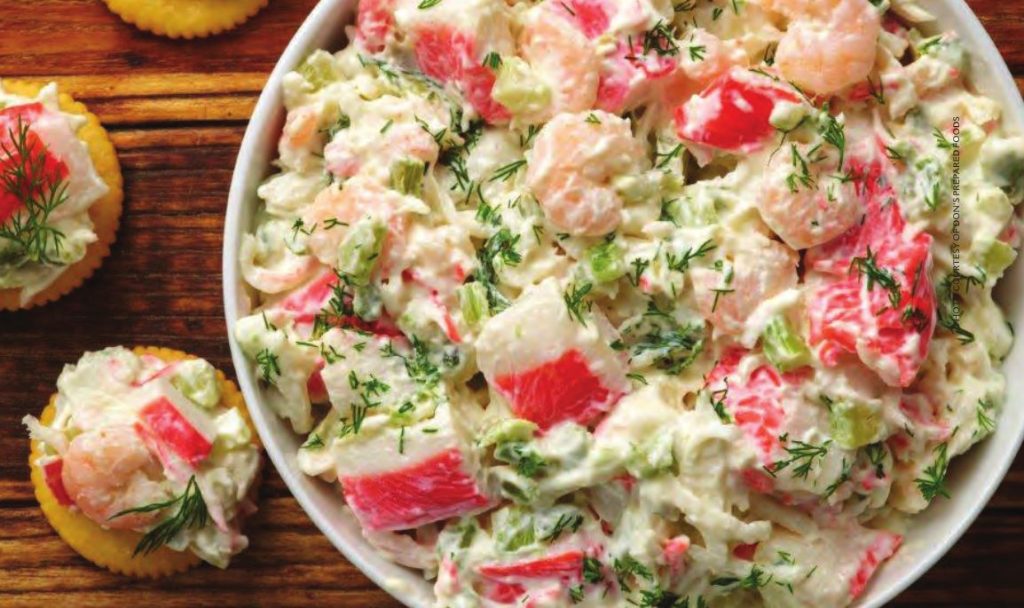Deli Salads: It’s What’s New in the Kitchen
July 5, 2023 | 8 min to read
The pandemic pushed consumers into the kitchen, enhancing the popularity of packaged salads, which saw sales reach $3.3 billion in 2022. With inflation driving a desire for cost-effective meals, deli salad sales climbed 11% to $4.1 billion. This trend persists globally, driven by an interest in quick, health-conscious options. Consumers now seek unique, plant-based salads alongside traditional fare. Retail strategies focusing on meal solutions and exciting promotions are essential for engaging shoppers in this growing segment.

COVID drove consumers to the kitchen, and inflation keeps them there.
Sales of salads, especially packaged salads, surged during COVID, and that trend seems poised to continue.
With restaurants closed during the pandemic, many consumers returned to the kitchen to satisfy their appetites for fine food.
But cooking is hard stuff, and adding prepared deli salads offered a way to slice off at least a little of the time involved in assembling a fine spread.
Salad kit sales rose to $3.3 billion in 2022, according to the Madison, WI-based International Dairy Deli Bakery Association’s (IDDBA) What’s in Store 2023, which ranked them behind only tomatoes and potatoes in fresh vegetable sales.
At the deli, salad sales are greater than sales of sandwiches, appetizers, soup and chili, and pizza, according to What’s in Store 2023.
The deli received a healthy share of this action, as deli prepared salad sales climbed 11% to reach $4.1 billion in the 52 weeks ending on Jan. 29, 2023, according to What’s in Store 2023.
“Many consumers prepare hybrid meals, combining some items cooked from scratch with items that are semi or fully prepared,” says Heather Prach, vice president for education at IDDBA. “Salad bar sales are adding to pre-packaged deli salads, which is resulting in record sales.”
This upward trend did not end with the pandemic, and it is not limited to the U.S.
“The global packaged salad market size was valued at $10.78 billion in 2020 and is expected to expand at a compound annual growth rate (CAGR) of 8.2% from 2021 to 2028,” according to the Global Packaged Salad Market 2023-2030 report prepared by Grand View Research, San Francisco. “The growth of the market can be attributed to the rising popularity of salads and the ease of consumption.”
Grand View is a U.S. and India-based market research and consulting firm that offers market intelligence studies.
“The availability of pre-packed salads containing a variety of vegetables and fruits, dressed in condiments and dressings, and supplemented by a variety of meats and seafood has fueled the market growth,” according to the Grand View report. “The COVID-19 pandemic has offered some respite to the market for packaged salad, as people around the world have taken an unprecedented interest in cooking at home.”
Restaurants have largely reopened, but if the pandemic drove consumers to the kitchen, inflation keeps them there.
“With inflation on the rise, consumers are looking for ways to stretch their food dollars — without sacrificing taste or flavor,” says Anne Nelson, deli brand and strategy manager at Reser’s Fine Foods, Beaverton, OR. “There’s an opportunity to show consumers how to ‘build a meal’ that is quick, convenient and delicious. Educating the consumer in-store with the right assortments and signage helps to ensure success.”
Reser’s Fine Foods began in 1950, when Mildred Reser began making her potato salad in bulk and selling it through local stores to supplement the family income. The business has grown to offer a line of deli salads, sides and dips.
“People are still facing cooking fatigue at home, so look for ways to surprise and delight them,” says Nelson. “Introducing new flavors helps keep things fresh and shoppers coming back to discover the latest prepared foods, flavors, meal kits and grab-and-go items.”
The pandemic created a perfect storm for the expansion of grab-and-go salad sales.
“COVID changed all the rules,” says Carl Cappelli, senior vice president of sales and business development at Don’s Prepared Foods, Schwenksville, PA. “Consumers wanted restaurant-quality meals at home, but the salad bars, olive bars and prepared foods bars all closed.”
“Consumers buying staples know what they want,” Cappelli says. “It is the meal solutions where the incremental sales take place.”
Make Mine Packaged
Packaged salads, in particular, are enjoying greater popularity because they offer grab-and-go convenience and protection from the anxiety of not knowing where the fingers pawing through the salad bar have been.
“The prepackaged salads are huge,” says Kali Kinziger associate product manager at Placon, Madison, WI. “Were seeing them in the grab-and-go section.”
Placon is a leading supplier of thermoformed packaging that offers security, convenience and a commitment to the environment.
“Our packages are made from recycled material and are recyclable, so everything is sustainable,” says Kinzinger. “About 70% of consumers will choose the more sustainable option.”
This craving for convenience expresses itself in other areas of the store beyond the deli.
“Salad kits, on-the-go fruit and vegetable snacks, and oven ready pre-washed vegetable items are great solutions to keep the lunch, dinner and snacking dollar at retail,” says Joe Watson, vice president for retail, foodservice and wholesale at the International Fresh Produce Association (IFPA), based in Newark, DE.
Not Your Grandparent’s Deli Salads
The salads that fill out a home prepared meal are not your grandparent’s picnic salads.
“It is not the 1970’s; consumers seek items beyond potato salads, macaroni and cole slaw,” says Cappelli. “They want plant-based, clean, cool, unique, edgy and globally-inspired sides and grains. “These items from Don’s have grown in popularity, as more Americans work from home. They want restaurant-style items and creative meal solution ideas.”
Don’s offers a line of Artisan Deli salads that includes an antibiotic-free white chicken meat salad and a wild caught yellowfin tuna salad.
“Grains and sides sold from behind the deli glass case did well, cool things that pair well with in-home meals,” says Cappelli. “Consumers wanted, and still do, more meal solution ideas from retail deli and prepared foods. The most common deli salad items have been tuna, chicken, egg, potato, macaroni and cole slaw. They are the ‘belly-stuffers,’ or commodity salad items, at a lower price. However, today’s consumers seek more. They want clean, cool flavors and unique sides.”
“Reser’s offers a comprehensive portfolio that retailers can quickly put together to provide gvalue and convenience for customers. It also keeps keep consumers coming back to the deli to discover fresh new flavors, and bring variety to their dinner table,” says Nelson. “Potato salad, pasta salad, macaroni salads and coleslaw are perennial favorites.”
Beyond the belly-stuffers, more consumers want plant-based hearty salads.
“There is huge demand for healthy, cool unique plant-based sides and grains,” says Cappelli. “It can vary by generation. Millennials are motivated by sustainability and environment. Boomers and Gen X are motivated by eating healthier without sacrificing flavor. We offer more salads meeting vegan and vegetarian criteria than others.”
Vegetarian options continue to lead the salad category, as consumers want healthier food options.
“The rising number of health-conscious consumers around the world is driving the demand for vegetarian products,” according to the Grand View report. “Individuals shopping for organic produce/products continue to generate significant demand for vegetarian packaged salads in this regard. At a macro-level, the rising popularity of vegetarian and vegan food, most notably in European and North American countries, continues to boost demand for vegetarian salads.”
Leafy vegetables have a leg up when it comes to supplying a variety of important vitamins and minerals.
“Over the past few years, consumers’ food preferences have been gradually shifting toward healthy plant-based foods. These salads containing numerous leafy vegetables are full of nutritional properties and are an excellent source of fibers, minerals, vitamins and proteins. Moreover, these salads are rich in antioxidants; Vitamins A, K, C and E; iron; calcium; and potassium.”
There is still, however, significant room for growth of salads offering healthy protein.
“The vegetarian segment held the largest share of 67.4% in 2020 and is expected to maintain its lead,’ according to the Grand View report. “The non-vegetarian segment is projected to register a significant combined annual growth rate of 8.2% from 2021 to 2028. Shifting consumer focus toward protein-enriched diets to achieve the desired body figure or shape has been contributing to the demand for non-vegetarian packaged salads worldwide. Brands offering such products typically market products as a wholesome choice for the present-day active lifestyle. White chicken meat is one of the most common ingredients used in non-vegetarian packaged salads.”
Don’s offers a list of 31 clean label items with no artificial flavors, preservatives or colors, and a continuously updated list of vegetarian and vegan items.
Sell the Meal
The role of prepared salads as a part of home-prepared meals suggests a merchandising strategy.
“Salads absolutely have a place in meal bundling programs,” says Nelson. “Traditional salads like potato and macaroni salads are complements to both cold and hot mains from sandwiches to ribs. Recently, we’ve seen increased demand for complete meals, as well — noodle and pasta salads, which include protein and can be served cold or hot like our Korean-style noodle salad with beef. Providing consumers and retailers with a range of options for ready-to-eat and ready-to-heat programs keeps them engaged with this exciting and growing new segment of the deli.”
More than just the salads individually, the deli does well to sell meal solutions that include the salads.
“Retail deli departments offer meal solutions and suggest plating ideas,” says Cappelli. “Don’s offers retail deli menu ideas and serving suggestions. Consumers want ideas and solutions. The best merchandising is showing meal solution ideas for consumers.”
Reser’s advertises itself as a Proud Sponsor of Good Times, and the company offers its retail partners point of sale materials that link salads to particular good times.
“In-store promotions tied to specific events such as barbecue competitions, music festivals, sporting events and sweepstakes are a great way to generate excitement — and sales,’ says Nelson. “Reser’s NASCAR program and partnership with Joe Gibbs Racing encourages consumers to stock up on race days. We leverage the energy of racing in key markets over the 38-week season by using racing-themed point-of-sale materials, digital promotions, in-store radio and social media. We also are running a new Good Times.”
Although the convenience of grab-and-go is attractive to many consumers, Don’s also offers larger batch salad products, and Cappelli believes retailers could do well to invest time in sales behind the glass.
“Sell behind the glass,” he advises . “The perception is it is made fresh in-store. While labor challenges plague retailers, selling behind the glass and in-store food bars yield the best results.”
1 of 6 article in DeliBusiness June/July 2023

